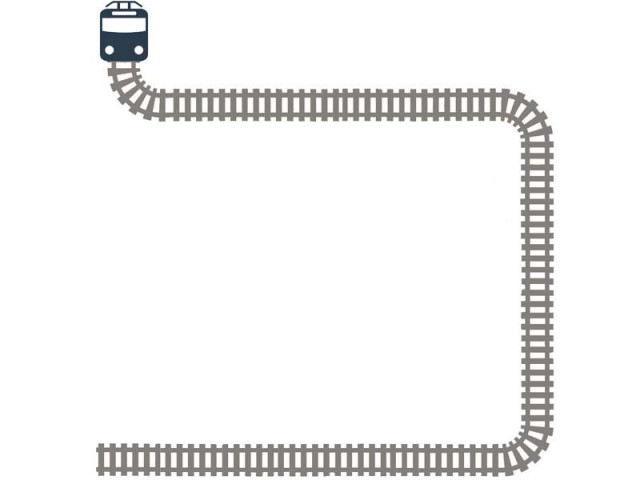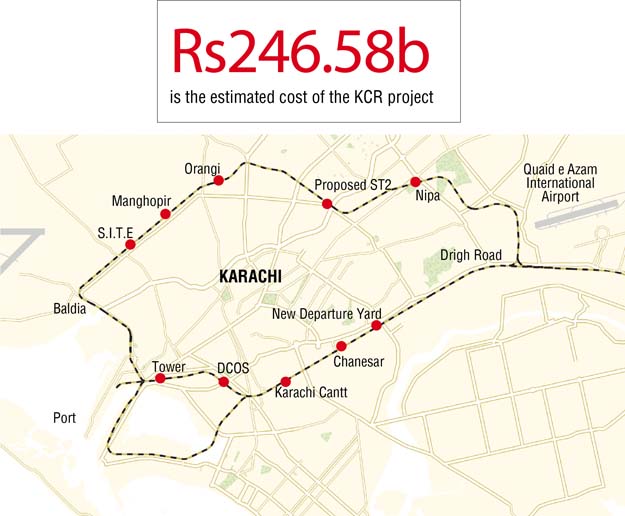In transport-starved Karachi, fate of KCR hangs in balance
Japanese company unwilling to give financial commitment until certain conditions are met

Japanese company unwilling to give financial commitment until certain conditions are met. DESIGN: TALHA KHAN
Due to the deadlock between the Japan International Cooperation Agency (Jica) and the Sindh government over the agency’s financial commitment for the project, the KCR is likely to hang in the balance in the years to come.
Jica is not ready to give its financial commitment for the project until certain conditions are met. On the other hand, the Sindh government is not ready to meet any further conditions of Jica unless the latter gives its financial commitment.
China approves $5.5b for Pakistan’s main rail link
The KCR is the dualisation of a 29.41-kilometre-long KCR loop along with the provision of a 13.69-kilometre-long, two-way dedicated track along Pakistan Railways’ mainline, which stretches from Karachi City Station to Drigh Road Station. The estimated cost of the KCR project is Rs246.58 billion.
Jica had expressed interest in the project in 2010. The subsequent five years were consumed in negotiations, proposals, counter-proposals, meetings, conditions and appraisals, due to which groundwork on the project could not be initiated.
Jica is supposed to undertake the project on soft loan terms and conditions at a 0.1% interest rate that must be returned within 40 years.
According to transport secretary Tauha Ahmed Farooqui, the Sindh government was supposed to meet 46 conditions of Jica, after which the agency was supposed to stark work. “The last demand was the exemption of the provincial tax duty, which was also met,” he said, adding that the Sindh government wanted Jica to send a letter of comfort, appraisal mission and loan negotiation. However, Jica failed to do so.
The letter of comfort is a document that is proof of the commitment of the donor for the project, after which further proceedings are then initiated. In appraisal mission, proceedings are reviewed and financial decisions are taken and then the loan negotiation takes place.
Farooqui explained that Jica wanted the Sindh government to carry out a survey for the KCR. “The survey was one of the conditions we had to meet,” he explained, adding that in 2009, the same survey was carried out but that became stale due to Jica’s apathy and then in 2013, a re-confirmatory survey was conducted again.
Now in 2016, he said, Jica wants the Sindh government to carry out another survey. “But we want to ink the letter of comfort with them, otherwise Jica will again demand a fresh survey in 2018,” he said.
Jica’s concerns
According to the letter written by Jica to the Ministry of Finance on June 12, 2015, the basic investigations for the formulation of the KCR project have been covered by Jica’s preceding surveys in 2008-2009 and in 2011-2013 in association with counterpart personnel of the Karachi Urban Transportation Corporation (KUTC) - the institute for restoration and management of KCR registered with the Security and Exchange Commission of Pakistan.
As Pakistan failed to comply with the conditions of International Monetary Fund’s (IMF) programme in 2011, said the letter, it became difficult for the government of Japan and Jica to actively formulate the KCR project due to concerns over Pakistan’s debt sustainability.
Also, it is mentioned in the letter that Jica does not have a mandate to make an indication over the decision to provide the loan by any means such as sending a letter of comfort.

However, Jica admitted in the letter that the macroeconomic situation of Pakistan has improved and it is ready to restart formulating the KCR project if the Pakistan government is interested.
Apart from the project formulation, there are several prerequisite conditions that are to be met before the loan provision to the KCR project, said the letter, which are stable macroeconomic situation, that is steady progress of the IMF programme in Pakistan, stable security situation in Karachi and overall Pakistan, and compliance with Jica’s guidelines for social and environmental considerations.
Explaining the third point, the letter recommended the Pakistan government to execute the domestic plan, which included resettlement of residents from the right of way of the route of KCR by providing compensation, shifting of Pakistan Railway track and construction of a boundary wall along the route of the KCR to prevent further influx of population, after appraisal by Jica.
The Sindh government, on the other hand, had already signed a Memorandum of Understanding (MoU) with the China Railways Construction Company International (CRCCI) in August, 2014, for the KCR project. Nonetheless, the MoU has no legal standing.
Meeting with stakeholders
A meeting was held to discuss the progress of the KCR in the Planning Commission of Pakistan on October, 2015. According to the minutes of the meeting, a senior representative of Jica said that the KCR is on the agency’s priority list. However, according to the official, Jica was concerned that the project might be handed over to the Sindh government and then executed by some other company, hinting towards CRCCI.
Accordingly, Jica wrote for a clarification from the Economic Affair Division (EAD), whose response is still awaited. However, the official said that in two meetings held in EAD in May, 2015, and June, 2015, Jica asked the KUTC and Sindh government to execute its domestic plan and conveyed expected timelines for the implementation of the project.
On the other hand, the Sindh government requested Jica to give a clear-cut stance on the project with a proper implementation plan and timelines from the Jica and government of Japan.
Regarding the redo of survey and implementation of the domestic plan, the Sindh government official stated that those were minor issues and could be resolved during execution of the project since once the activity is started on ground, the local public will be motivated and all the process will kick off simultaneously.
Due to the MoU signed by the Sindh government with the CRCCI, the Ministry of Railway’s director-general for planning, Mazhar Ali Shah, said that Pakistan Railways has moved a draft summary to the prime minister for handing over the project to the Sindh government.
In signing the MoU, Shah pointed out that the federal government or railway ministry was not taken on board and, hence, in the backdrop of the MoU, such decision is taken and the land required by the railway ministry would also be leased to the Singh government on mutually agreed terms and conditions.
Later in the meeting, a decision was taken that Jica will provide clear consent and commitment for undertaking the project along with roadmap and implementation and timelines within one week for executing the project without further delays. Otherwise, the option suggested by the Sindh government for Chinese funding will be considered.
Jica’s deputy resident representative, Mahmood A Jillani, refused to comment on the issue. However, Farooqui said that Chief Minister Murad Ali Shah is keen to initiate the project and find a solution.
Talking about Jica, he said that the Sindh government needed their commitment otherwise they may go for international bidding. Meanwhile, an official of the KUTC, requesting anonymity, said that the project may never be able to initiate in the near future as Jica’s priority is the federal government, not the provincial.
Minister railways considers KCR ‘faulty’
Railways Minister Khawaja Saad Rafique said in a recent press conference in Karachi that the basic planning of the KCR is faulty.
The formation of the Karachi Urban Transport Company (KUTC), whose 60% share belongs to the federal government, 25% to the Sindh government and 15% to Karachi’s local government, is flawed, he said. According to him, the metros must run under the local government. Jica, according to Rafique, is ready to offer long-term concessional loans, but with the condition to rehabilitate the encroachers. “We had asked the former chief minister of Sindh, Qaim Ali Shah, to rehabilitate the encroachers but the Sindh government never paid heed,” he said.
He added that the federal government has also offered to transfer the land for the KCR to the Sindh government so that construction could begin. However, he claimed, this suggestion was also not paid any heed to.
Meanwhile, an official of the KUTC told The Express Tribune that the federal government wants to lease the Pakistan Railways’ land to the provincial government. He added that the lease will prove to be very costly and the provincial government is not in a position to bear such a heavy cost.
Published in The Express Tribune, November 9th, 2016.


















COMMENTS
Comments are moderated and generally will be posted if they are on-topic and not abusive.
For more information, please see our Comments FAQ